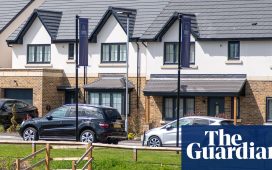One of the UK’s fastest growing property markets is dominated by corporate landlords focused on providing homes for couples and singles, excluding many families with children, according to a thinktank report.
The build-to-rent (BTR) sector constructs one in five new homes – including almost 30% of new homes in London – the Common Wealth thinktank says. It is concerned that the Labour government is turning to a select group of private equity-backed developers for a quick fix to the housing crisis. In a report, Open for Business or Up for Sale, the thinktank says a boom in developments designated for renters is being backed by “profit-seeking institutional investors”, often based overseas. Common Wealth said its research showed that four of the top five operators were backed by private equity funds and several were based abroad.
The sector could be at the heart of Labour’s housing plans to build at least 1.5m homes by the end of the parliament.
Corporate landlords could be given a large slice of land in Labour’s 12 new towns, allowing them to deliver as much as a fifth of the expected 10,000 properties in each location.
Almost 90% of BTR properties are occupied by couples and flatshares, or single individuals rather than families, the report says.
This compares with the private rented sector as a whole, where one in four households are families. Manchester, Birmingham, Leeds and Wakefield are among the cities with the highest concentration of BTR.
“Housing in the sector also skews toward households on above-average and higher incomes, with industry data showing households in BTR are much more likely to be on incomes of over £68,000 a year than the average for the private rental sector,” the report says.
In the top five BTR groups are Greystar Europe, Get Living, Simple Life Homes, Quintain Living and the L&Q PRS, a subsidiary of the social housing provider London and Quadrant.
Simple Life Homes, which is owned by Sigma Capital, has several developments in the UK, including one- to three-bedroom homes available at its Albion Homes site in Salford, Greater Manchester. The housebuilder also manages private estates in Kent, Derbyshire and Devon.
Ministers are known to favour handing over large tracts of development land to the new breed of corporate landlords in order to speed up the delivery of new housing.
Advertising newly built rental properties and signing contracts with tenants can take months rather than the years it takes to sell homes on sites of more than 500 dwellings.
The arrival of renters in large numbers on a site in the early stages of a development encourages the providers of amenities such as schools, doctors’ surgeries and shops to open premises earlier and not wait several years until the development is sold to individual buyers.
Homes in BTR developments are constructed for the private rental sector and units are not for sale to individual buyers. Buildings are owned by one single owner or consortium, typically institutional investors.
BTR developers are often criticised for drip-feeding properties into the local market to maintain prices.
According to estate agent Savills, BTR housing stock stood at 105,000 homes at the end of 2023 from a private rented housing stock of about 5m homes.
Marcus Dixon, head of research at real estate advisers JLL, said it was likely that foreign-backed funds were early adopters in the UK because their home markets in the US and continental Europe already had large institutional rental sectors.
after newsletter promotion
“It is a very stable income stream and compares favourably to other property markets like commercial offices and retail,” he said.
“There are some UK pension funds looking at this market, but it is a more established concept in the US and Germany, where it is known to be a reliable business,” he added.
Rob Sumner, residential investment director of Simple Life Homes, said the BTR sector provided extra homes in addition to properties for sale and social housing. He said in many cases “houses would remain unbuilt were it not for the intervention of us and others like us”.
He added: “Anecdotally, the homes delivered for us are typically the first to be built on a site and provide a much quicker sense of placemaking … Families with children constitute approximately 50% of our residents.”
Sumner said the firm mainly built suburban homes for families, recognising that there was “a whole section of society who were too economically active to qualify for social provision but not in a position to be able to gather sufficient funds for a purchase deposit. And why should they have to settle for inferior quality housing stock?”
A spokesperson for the Ministry of Housing, Communities and Local Government said: “We do not recognise these claims, and have committed to delivering a gold standard of 40% genuinely affordable housing for new towns, with a focus on social rent homes.”
Common Wealth said in its report: “The UK is in the midst of an unrelenting housing crisis, weighed down by issues of unaffordability, insecurity and inaccessibility. Along with falling home ownership, these conditions are leaving the UK with an ever-expanding private rental sector where profit-seeking institutional investors are both an important and rapidly growing presence.”
It said ministers should seek to control the profits made by BTR developers on land designated by the public sector for housing.









